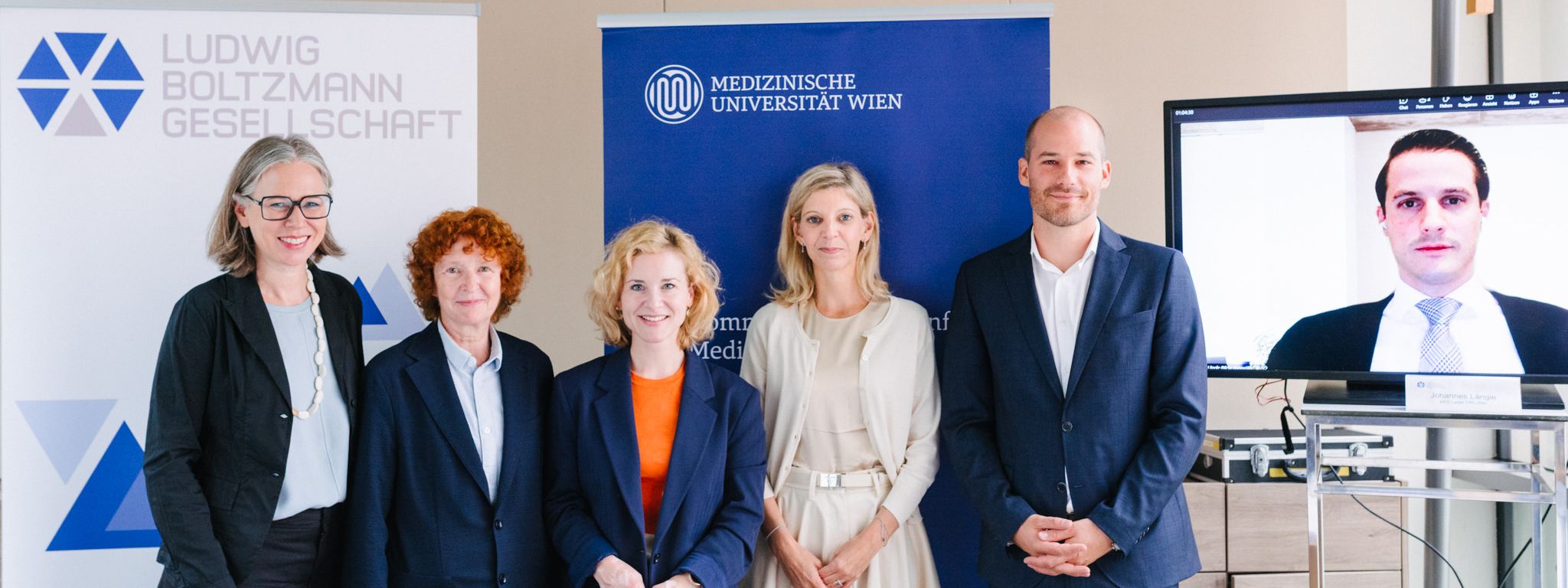
(Vienna, 7 July 2025) The Clinical Research Groups (KFG) funding programme launched by the Ludwig Boltzmann Society (LBG) is Austria's first collaborative research initiative with a clear focus on patient-oriented, medically relevant topics in the field of non-commercial clinical research. The LBG has thus been closing a gap in clinical research and in the translation between basic research and application-oriented development since 2022. Today, three new KFG groups in the fields of oncology and neurology were presented at a press conference attended by Federal Minister for Women, Science and Research Eva-Maria Holzleitner, LBG President Freyja-Maria Smolle-Jüttner and Vice Rector for Research and Innovation at MedUni Vienna Michaela Fritz.
With total funding of 24 million euros from the BMFWF and the Future Fund Austria, three research groups can now concentrate fully on their research thanks to the LBG. "The funding programme underlines Austria's commitment to patient-oriented and practice-oriented clinical research. We are not only a sponsor, but also actively involved in shaping the future as a bridge builder between practice and science. We ensure evidence-based innovation in healthcare and thereby strengthen Austria as a centre of health and research," said Eva-Maria Holzleitner, Federal Minister for Women, Science and Research.
LBG President Freyja-Maria Smolle-Jüttner is also delighted: "The great interest in our KFG programme impressively demonstrates the potential of clinical research in Austria. With the three new clinical research groups, we are focusing on excellent, interdisciplinary teams that develop scientific findings directly for the benefit of patients. Our goal is to bring clinical research even closer to the needs of patients while providing new impetus for excellent science in the life sciences."
"The new programme starts exactly where it is most needed: promoting synergies and more intensive cooperation within our scientific community,’ says Michaela Fritz, Vice Rector for Research and Innovation at MedUni Vienna. "We see an enormous need in the field of investigator-driven studies in particular. The Clinical Research Groups not only create a valuable structure here, but also enable interdisciplinary research to be strengthened in a targeted and sustainable manner. It is a great programme that will contribute to the long-term structural improvement of our research location."
The three KFG at a glance: Improving quality of life for patients with bowel cancer, bladder cancer and epilepsy
In line with the EU Mission Cancer, this year's call focuses on cancer research. Following a comprehensive call for proposals, the three new research groups "CRC-Res", "StrikeBC" and "EPICONN" were selected by a high-calibre international expert commission and will now receive funding for up to eight years and up to approximately eight million euros each:
CRC-Res: Combating therapy resistance in colorectal cancer with personalised tumour models
Around 50 percent of patients with colon cancer cannot currently be cured. The main problem arises when metastases form and chemotherapy or immunotherapy are the only treatment options left. Although many patients initially respond well to treatment, they often develop resistance over time. This is compounded by the fact that every tumour is unique – no two are alike.
The CRC-Res clinical research group, led by Johannes Längle from the Department of General Surgery at the Medical University of Vienna, has set itself the task of identifying new therapeutic approaches to combat resistance to treatment using personalised tumour models. To this end, pieces of tumour tissue are removed and cultivated in the laboratory in order to specifically investigate which combination of active substances promises the best therapeutic effect.
StrikeBC: Improving the survival chances and quality of life of people with bladder cancer
Bladder cancer is the ninth most common cancer worldwide – and the number of people affected is steadily increasing. The disease places a heavy burden not only on patients but also on the entire healthcare system. A particular challenge in treatment is the highly individual nature of the disease.
Under the direction of Bernhard Englinger from the Department of Urology at the Medical University of Vienna, the StrikeBC clinical research group is pursuing the goal of making the treatment of bladder cancer more targeted, individualised and gentler. To this end, a wide range of information is collected – for example, from blood and tissue samples, imaging examinations and laboratory experiments with models that replicate the disease. Modern data analysis methods are then used to investigate how this information interacts. The research goal is to develop treatments that are tailored to each individual, thereby improving the survival chances and quality of life of people with bladder cancer.
EPICONN: Predictive and personalised treatment for focal epilepsy
Epilepsy is a neurological disorder that causes recurrent seizures. When these seizures originate in specific areas of the brain, the condition is referred to as focal epilepsy. This can affect both physical and mental health, restrict social life and reduce life expectancy. In most cases, the seizures can be controlled with medication. However, around one third of patients do not respond to drug treatment.
A new scientific approach assumes that the causes of epilepsy are not limited to individual brain regions, but affect extensive networks in the brain. The EPICONN research group, led by Silvia Bonelli-Nauer from the Department of Neurology at the Medical University of Vienna, has set itself the goal of identifying these complex changes. To this end, biological characteristics of the brain – known as biomarkers – are being identified. These make it possible to find the best possible treatment for each individual more quickly. In addition, they provide insights into how epilepsy affects the brain, which factors are related, how they affect the course of therapy and who is particularly affected by side effects. The goal is to develop proactive and personalised treatment that significantly improves the quality of life of people with epilepsy.
In the first four years, 300 people with focal epilepsy will be invited to participate in the study. In a second funding period lasting another four years, the findings will be put into practice in several Austrian epilepsy centres.